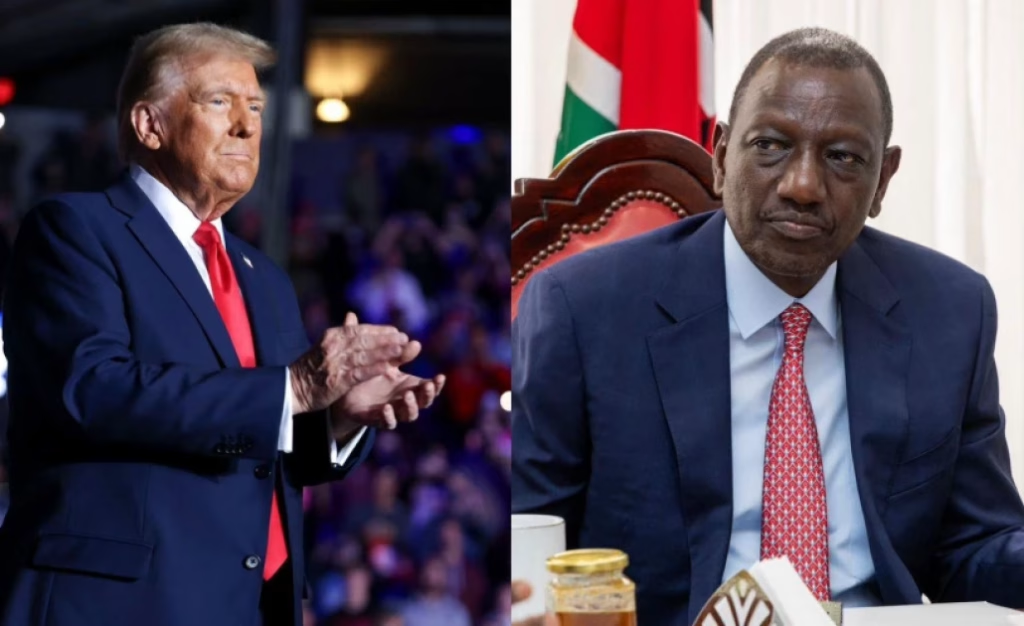When Donald Trump took office in 2017, few Kenyans could have predicted how his “America First” policies would ripple across the Indian Ocean to affect life in East Africa. From WhatsApp groups buzzing with heated debates to business owners recalculating their export strategies, Trump’s presidency left lasting fingerprints on Kenya’s economic and social fabric.

The Trade Tango: Dancing to a New Beat
Remember when buying second-hand clothes from America was as common as drinking chai? Trump’s presidency shook up this decades-old tradition. His administration’s harder stance on trade agreements forced Kenya to reassess its position in the global market. While the famous “mitumba” (second-hand clothes) trade initially faced uncertainty, it actually led to something unexpected – Kenya began strengthening its local textile industry.
The story of Mary Wanjiku, a Gikomba market trader, illustrates this perfectly. “When the American policies changed, we had to adapt. Now I mix imported clothes with local designs, and surprisingly, my customers love it!” she says.
Tech and Investment: The Silicon Savannah Shift
Trump’s restrictive immigration policies had an unexpected silver lining for Kenya’s tech scene. As Silicon Valley became less welcoming to international talent, some Kenyan techies who had planned to move to the US chose to stay home instead. This contributed to Nairobi’s growing reputation as Africa’s “Silicon Savannah.”
Take James Mwangi’s story, for instance. After his US tech job plans fell through due to visa restrictions, he launched a successful fintech startup in Nairobi. “What seemed like a setback became an opportunity to contribute to Kenya’s digital revolution,” he reflects.
Aid and Development: A New Chapter
Trump’s “America First” approach led to significant shifts in foreign aid policies. Kenya, which had long relied on American support for various development projects, had to diversify its international partnerships. This pushed the country to strengthen ties with other nations and focus more on self-reliance.
The change was particularly noticeable in healthcare. When American funding for certain health programs became uncertain, Kenya accelerated its own universal healthcare initiatives and strengthened partnerships with other international allies.
Environmental Impacts: Going Green Despite the Storm
Trump’s withdrawal from the Paris Climate Agreement could have discouraged Kenya’s environmental efforts. Instead, it had the opposite effect. Kenya doubled down on its green energy commitments, becoming a leader in renewable energy in Africa. The Lake Turkana Wind Power project, Africa’s largest wind farm, symbolizes this commitment to sustainable development regardless of US policy shifts.
Cultural Waves: From Twitter to Tea Time
Trump’s presidency influenced Kenyan social media and political discourse in fascinating ways. His communication style and use of Twitter sparked debates about political communication in Kenya. Some local politicians even adopted similar social media strategies, for better or worse.
The phrase “Fake news,” popularized during Trump’s era, became part of Kenya’s political vocabulary, leading to increased media literacy initiatives across the country.
Business and Entrepreneurship: Adapting to Change
The Trump years taught Kenyan businesses valuable lessons in adaptability. When traditional markets faced uncertainty, entrepreneurs found new opportunities:
- Local manufacturers stepped up to fill gaps in the market
- Tech companies diversified their client base beyond US partnerships
- Agriculture exporters explored new markets in Asia and Europe
Looking Forward: Lessons Learned
The Trump presidency showed Kenyans the importance of economic resilience and self-reliance. While international relations remain crucial, the experience encouraged Kenya to:
- Strengthen regional trade partnerships within Africa
- Invest more in local manufacturing and technology
- Diversify international alliances beyond traditional partners
- Build stronger domestic markets
The Silver Lining
Perhaps the most significant impact of Trump’s presidency on Kenya was psychological. It reminded the country that over-reliance on any single international partner, no matter how powerful, carries risks. This realization has contributed to a more confident, self-reliant Kenya that’s better prepared to navigate the complexities of global politics.
As one Nairobi economist puts it, “Trump’s presidency taught us that Kenya’s future ultimately lies in Kenyans’ hands. That’s possibly the most valuable lesson we could have learned.”
Whether you view Trump’s presidency positively or negatively, one thing is clear: it prompted Kenya to think more independently about its place in the world. And in that sense, maybe we should say “Asante” (thank you) for the wake-up call.